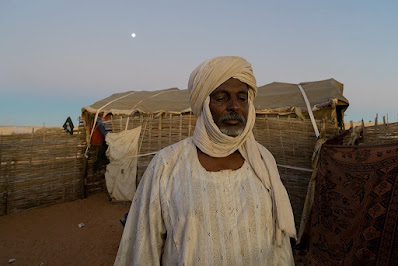By Klaas Van Dijken, Nouska du Saar
Published 19 February 2020 - here is a full copy:
Sudan’s violent new rulers
Traveiling with perpetrators of Darfur atrocities illuminates self-styled saviors
After Sudan’s long-serving dictator Omar al-Bashir was toppled by protesters in 2019, the country was back in the headlines early in 2020 when its transitional government handed him to the International Criminal Court to face charges of war crimes. Bashir’s alleged crimes took place in the western region of Darfur between 2003 and 2008 after he tasked a notorious Arab militia with crushing an insurgency by African tribes with the backing of the Sudanese army. Known then as the Janjaweed, or “devils on horseback,” these fighters have since restyled themselves as the Rapid Support Forces. Their leader, Mohamed Hamdan Dagalo – better known as Hemedti – has also rebranded himself, as the guardian of democratic transition in Sudan. His influence stretches from Sudan’s borderlands to the capital, Khartoum, where he shakes hands with world leaders. But a guided tour through a sleepy desert city reveals how Bashir’s heir apparent really sees Sudan’s future, and exposes the devastation and division wreaked by his forces.
METHODS
Combining a range of research methods including travel writing and traditional war reporting with the analysis of satellite imagery, this investigation seeks to shine a torch on the true violent nature of Sudan’s self-professed democratic guardian, and his paramilitary force. Embedded with members of Hemedti’s Rapid Support Forces in a tour to remote parts of North Darfur, we secretly collected coordinates of areas being targeted by Hemedti’s paramilitary forces. Extending the investigation, we obtained and analyzed leaked documents on future plans of Hemedti and his forces for parts of Darfur. To corroborate our findings and deepen our insights, we also interviewed confidential sources in secret locations and spoke to Hemedti himself in his luxury residence in the capital Khartoum. Finally we analyzed satellite imagery of destroyed villages in North Darfur and linked them to reports of attacks by the paramilitary group.
STORYLINES
Our reporter travelled to Zurrug, an outpost of Darfur so remote that it has yet to appear on Google maps. A desert outpost whose sparse shacks are illuminated by campfires that throw shadows over pick-up trucks mounted with anti-aircraft guns – the only hint of the violent past of this city-in-the-making in Sudan’s troubled western province.
The town is under the control of Sudan’s most powerful man, Mohamed Hamdan Dagalo, or Hemedti., head of a paramilitary group that was one of the world’s notorious militias, the janjaweed, or devils on a horseback. Flanked by his fighters, rebranded as Rapid Support Forces, Hemedti plans to build a city on the spoils of a brutal war, according to official plans that may rely on funding from Saudi Arabia and the United Arab Emirates to materialize.
But community leaders from camps in North Sudan claim to have been violently driven off land they had inhabited for centuries by Hemedti’s henchmen. They are among hundreds of thousands scattered across camps in Darfur who claim to have been violated and forced from their homes by the RSF after bearing the brunt of the war crimes ascribed to Bashir.
Satellite images have revealed the extent of the destruction wreaked by Hemedti’s fighters to villages to date, attacks corroborated by independent media and other sources.
Although Hemedti insists he has the best interests of all the Sudanese people at heart — claims he pressed during an exclusive interview — the grand plans of Bashir’s would-be successor for Zurrug rather point to a a winner-takes-all vision that could spell new upheaval for the strife-torn nation. Already disenfranchised ethnic groups, their appeals for a resolution snubbed, are warning of armed insurrection.
COPUBLISHED WITH
Trouw
The Guardian
Co-publications from this investigation
- The Guardian: Blood, sand and gold: victor’s city rises from ashes of Sudan’s civil war
- Trouw: Built on stolen land
- Trouw: He wants to do the right thing for Sudan - he says
View original: https://www.lighthousereports.com/investigation/sudan-violent-new-rulers/#impact
[Ends]





